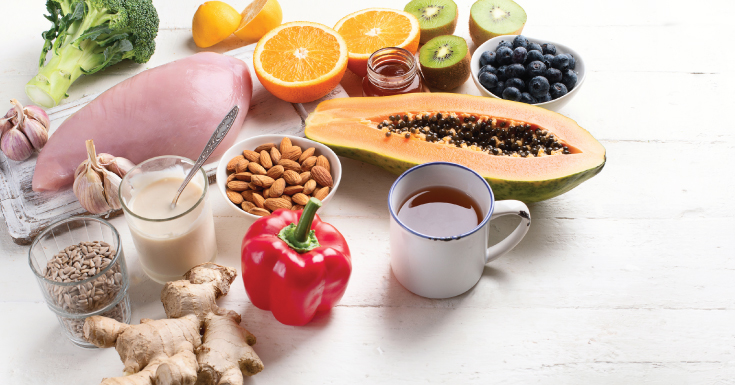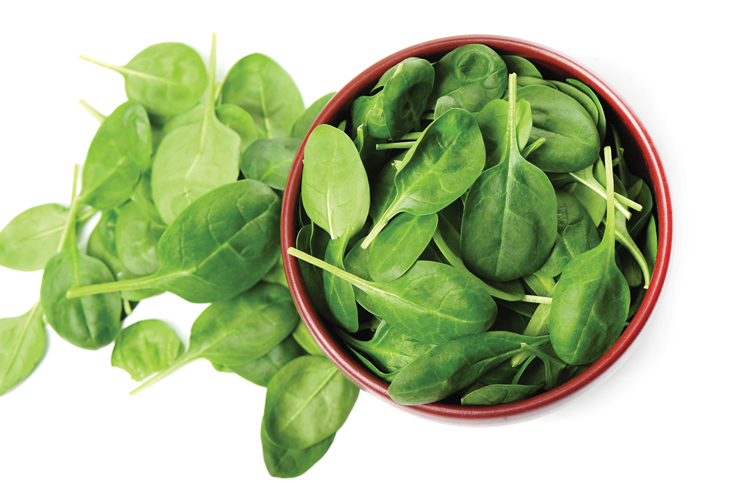A strong immune system is the key to staying healthy and preventing illnesses. One of the best ways to improve your body’s immunity is a healthy diet that includes a variety of nutrient-dense foods.
While a number of healthy foods has been shown to have positive effects on our immune system, MyHEALTH advises that there is no specific food or nutrient that has been clinically proven to “boost” the immune system all on its own. To improve our immunity, we will need a well-balanced diet that consists of protein, antioxidants, essential fatty acids, vitamins, minerals and phytonutrients.
Antioxidants are one of the essential nutrients to consume daily. According to MyHEALTH, antioxidants are substances that reduce, neutralise and protect our body cells from free radicals that can potentially cause cancer, heart disease and other life-threatening diseases. Many nutrition experts consider antioxidant as an important “line of defence” in our immune system.
“Foods that are high in antioxidants and phytochemicals help to boost our immune system,” Celeste Lau Wai Hong, a dietitian from Sunway Medical Centre adds. “They help to destroy free radicals and protect the structural integrity of cells and tissues, thus reducing the damage of membranes, enzymes and DNA.”
Highly beneficial antioxidant substances include beta-carotene, lutein, lycopene, selenium, Vitamin C and Vitamin E which can be found naturally in many kinds of foods including fruits, vegetables, nuts, grain, poultry, meats and fish. When these foods are consumed in a balanced diet, they help to increase antioxidant levels which protect the body from harmful free radicals.
Where Are Antioxidant Substances Found?
- Beta-carotene: found in many foods that are orange in colour such as apricots, carrots, pumpkin, mangos, sweet potatoes and peaches; also present in some green and leafy vegetables including spinach and broccoli
- Lutein: plentiful in green, leafy vegetables such as spinach, kale and collard green
- Lycopene: an effective antioxidant found in papaya, guava, watermelon, tomatoes, apricots, pink grapefruit and blood oranges
- Selenium: a component of antioxidant enzymes found in plant foods like rice and wheat
- Vitamin C: a potent antioxidant found in citrus fruits and juices, spinach, broccoli, kiwi, strawberries, cranberry, cabbage and green peppers.
- Vitamin E: present in many oils including wheat germ, corn and soybean oil; also found in apricots, broccoli, nuts, mango and other foods.
Reference: MyHEALTH (Kementerian Kesihatan Malaysia)
Apart from foods rich in antioxidants, Celeste recommends consuming high-quality protein like beans, nuts, soy and soy products, eggs, fish and lean meat as a base to build tissues and strengthen the body’s immune system.
An example of a sufficient protein intake is one palm-sized meat/chicken/fish or one piece of tofu (200g) per main meal. This is suggested for generally healthy people (those without kidney diseases).
Source: www.columbiaasia.com/malaysia/health-articles/tips-staying-healthy-during-lockdown-period
In a presentation by Kate Ueland MS, RD a dietitian specializing in oncology nutrition at the Seattle Cancer Care Alliance, she shares that deficiency of high-quality protein can result in depletion of immune cells, leading to the inability of the body to make antibodies, and other immune-related problems. For those who don’t consume meat or eat very little meat, it is important to increase their plant-based protein intake. “Many vegetables and grains are also excellent sources of immune-stimulating amino acids. For example, broccoli, brown rice, nut butters, mushrooms, nuts and seeds,” she says.
To further support the immune system, B Vitamins and Omega-3 fatty acids should also be included into daily meals. Fish and other seafood (especially cold-water fatty fish, such as salmon, mackerel, tuna, herring, and sardines) as well as nuts and seeds (such as flaxseed, chia seeds, and walnuts) are all excellent sources of Omega-3 while B Vitamins can be obtained from vegetables like Romaine lettuce, spinach, cauliflower, red bell peppers. If you need more B12 in your diet, go for sardines, salmon, tuna, cod, lamb, scallops, shrimp, and beef.
Although often overlooked, dietary fibre is also a crucial component to maintain a healthy immune system. According to Kate, the gastrointestinal tract contains the largest number of immune cells in the body, constituting approximately 60% of your entire immune system. This means a healthy gastrointestinal system is required to boost immunity.
“Whole, fresh fruits and vegetables promote a healthy gastrointestinal system. They are fermented by the friendly bacteria in your colon into short-chain fatty acids (SCFAs), which are used as a fuel by gastrointestinal tract cells,” Kate elaborates. “Fibre also promotes the removal of toxins that can adversely affect your gastrointestinal tract cells and supports healthy digestive function overall.”
Foods with high fibre content usually contain antioxidants. They can combat the effects of free radicals, which are associated with ageing, inflammation and degenerative diseases such as Parkinson’s and Huntington’s diseases.
Source: www.pantai.com.my/Nutrition-Dietetics
Fresh whole foods are also healthier for the immune system than the processed versions of them. “Fresh food has been proven to contain more micronutrients and phytochemicals. If you have a weak immune system, it is advisable to eat more fresh food, grains, fruit and vegetables. Decrease your intake of processed or refined food products. Also ensure foods are cooked properly to avoid food contamination and prevent unwanted infection.”

















